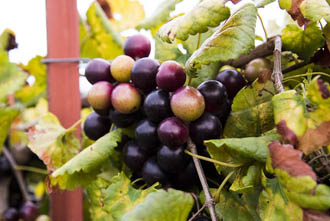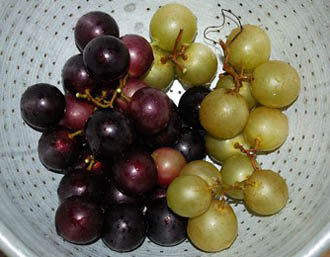Muscadines
Muscadines are a grape variety native to the southeastern United States, valued for their large, sweet, and juicy fruits that are enjoyed fresh or used in wine production.
As a subspecies of Vitis rotundifolia, they include numerous cultivars, each distinguished by its own flavor, texture, and growth characteristics.

|
| Muscadines- (Photo: Ark. Agricultural Experiment Station) |
Muscadine vines should be pruned in winter during their dormant stage. Remove any dead or diseased wood, and trim back healthy growth to encourage vigorous new shoots and improve fruit production.
Harvest season: These grapes typically ripen from late summer to early fall, depending on the region and growing conditions.How muscadines differ from European sweet grapes:
Muscadines, native to the southeastern United States, thrive in hot, humid climates and are naturally more resistant to pests and diseases, requiring less upkeep. In contrast, European grapes grow best in cooler, drier climates and demand more care to prevent disease and insect damage.
Physically, muscadines are usually larger with thick skins ranging from green to bronze, while European grapes are smaller, with thin skins that may be green, red, or black.
Flavor-wise, muscadines have a distinct musky taste, often described as “earthy” or “wild,” with a rich sweetness and slight tartness. European grapes tend to have a more familiar, delicate sweetness and milder flavor profile.
Health Benefits of Muscadines
Rich in Antioxidants: Muscadine grapes are one of the richest sources of antioxidants, particularly ellagic acid, resveratrol, and quercetin. These antioxidants help protect the body from damage caused by free radicals, which can lead to chronic diseases.
High in Fiber: Muscadine grapes are a good source of dietary fiber, which helps promote healthy digestion and can lower the risk of heart disease, diabetes, and certain types of cancer.
Cardiovascular Health: The polyphenols found in muscadine grapes can help improve cardiovascular health by reducing inflammation, lowering blood pressure, and improving cholesterol levels.
Boost Immune System: Muscadine grapes are high in vitamin C, which is essential for a healthy immune system. Vitamin C also acts as an antioxidant and helps protect the body from harmful free radicals.
Cancer Prevention: Studies have suggested that the antioxidants and polyphenols found in muscadine grapes may help prevent cancer by reducing oxidative stress and inflammation in the body.
Skin Health: Muscadine grapes contain resveratrol, a compound that has been shown to have anti-aging properties and can help protect the skin from damage caused by UV radiation.
Anti-inflammatory Properties: Muscadine grapes are also high in anti-inflammatory compounds, such as anthocyanins and flavonoids, which can help reduce inflammation in the body.
In summary, muscadine grapes are a nutritious and flavorful fruit that can provide numerous health benefits. They are high in antioxidants, fiber, and vitamin C, and may help reduce inflammation, improve cardiovascular health, boost the immune system, and prevent cancer.
| Principle | Nutrient Value | Percent of RDA |
|---|---|---|
| Energy | 57 Kcal | 3% |
| Carbohydrates | 13.9 g | 11% |
| Protein | 0.81 g | 1.5% |
| Total Fat | 0.47 g | 2% |
| Cholesterol | 0 mg | 0% |
| Dietary Fiber | 3.9 g | 10% |
| Vitamins | ||
| Folates | 2 µg | 0.5% |
| Riboflavin | 1.5 mg | 115% |
| Vitamin-A | 67 IU | 3% |
| Vitamin-C | 6.5 mg | 7% |
| Electrolytes | ||
| Sodium | 0% | 1 mg |
| Potassium | 203 mg | 4% |
| Minerals | ||
| Calcium | 37 mg | 3.7% |
| Copper | 0.119 mg | 13% |
| Iron | 0.26 mg | 3% |
| Magnesium | 14 mg | 3.5% |
| Manganese | 1.97 mg | 86% |
| Zinc | 0.11 mg | 1% |
| Phyto-nutrients | ||
| Carotene-α | 1 µg | -- |
| Carotene-ß | 39 µg | -- |
| Crypto-xanthin-ß | 0 µg | -- |
| Lutein-zeaxanthin | 64 µg | -- |
Selection and storage
 |
| Muscadines and Scuppernongs. (Photo: dalexfilms) |
Muscadines are typically in season from late August to early October in the United States, depending on the region and weather conditions.
When selecting muscadines, choose ones that are plump, firm, and fully colored, with a deep, rich hue characteristic of their variety. The stems should be green and supple. Avoid fruit that is overly soft, mushy, blemished, or has dried or brown stems, as these are signs of overripeness.
At home, storage depends on their ripeness and how soon you plan to use them. If they are not yet fully ripe, keep them at room temperature in a cool, dry place away from direct sunlight, allowing them to ripen gradually over a few days.
For ripe muscadines that you don’t plan to eat immediately, store them in the refrigerator to extend freshness. Place them in a plastic bag or an airtight container, ensuring they are completely dry before refrigeration.
Preparation and serving method
Muscadine grapes are enjoyed fresh, as a snack or dessert. They are also commonly employed for making wine, juice, jelly, and other culinary products.
Here are some serving tips;
Add to a salad: Muscadines can be sliced and added to a salad for a burst of sweetness. They pair well with nuts, cheese, and vinaigrette dressings.
Make jelly or jam: Muscadines are naturally high in pectin, which makes them perfect for making jams and jellies. You can use the pulp of the fruit along with sugar and pectin to create a delicious spread for toast or biscuits.
Bake a pie: Muscadines make a great filling for pies. Simply mix the fruit with sugar, flour, and a little bit of cinnamon and bake in a pre-made pie crust.
Make a sauce: Muscadines can be cooked down into a sweet and tangy sauce that is perfect for drizzling over ice cream, pancakes, or waffles.
Make a cocktail: Muscadines can be muddled and added to cocktails for a fruity and flavorful twist. Try mixing with vodka, lemon juice, and simple syrup for a refreshing summer drink.
Safety profile
Muscadine grapes are generally considered safe to eat and are a healthy addition to a balanced diet. However, as with any food, there are some precautions to keep in mind:
Pesticides: Muscadine grapes, like many fruits and vegetables, may be treated with pesticides to protect them from insects and diseases. To reduce exposure to harmful chemicals, it's best to choose organic or locally grown muscadines or to thoroughly wash and rinse the grapes before eating them.
Allergies: Some people may be allergic to grapes, including muscadines. Symptoms of a grape allergy may include itching, hives, swelling, and difficulty breathing. If you experience any of these symptoms after eating muscadines or any other grape variety, seek medical attention immediately. Medical Disclaimer.
Read further on:
≻≺ -Grapes Nutrition facts and Health benefits.
≻≺ -Raisins Nutrition facts and Health benefits.
≻≺ -Why is even 100% fruit juice not a healthier choice?
≻≺ -Pesticide Contamination in Produce: What the EWG’s Findings Mean for Your Health.
≻≻-Back to Fruits from Muscadines. Visit here for an impressive list of all varieties of fruits with complete illustrations of their nutrition facts and health benefits.
≻≻-Back to Home page.
Further reading and Resources:
Refer Stanford School of MedicineCancer information Page- Nutrition to Reduce Cancer Risk. (Opens in new window).